Although traditional learning has long been the standard, social learning and how it influences business training activities have recently received a lot of attention. But what is social learning? Can we only learn from our own experiences, or can we also learn through observing others, as proposed by the social learning theory? In order to address this question, psychologist Albert Bandura developed an intriguing experiment: the Bobo Doll experiment.
Table of Contents
- ما هي نظرية التعلم الاجتماعي لباندورا؟
- Some principles of observational or social learning theory
- Implications of social learning theory
- Advantages of social learning theories
- Disadvantages of social learning theories
- Infographics
- Knowledge Check!
- Conclusion
- Frequently Asked Questions (FAQs)
- What are the 5 principles of social learning theory?
- What is the main idea of social learning theory?
- لماذا يعد التعلم الاجتماعي مهمًا؟
- ما هي فوائد نظرية التعلم الاجتماعي؟
What is Bandura’s social learning theory?
In the 1960s, Albert Bandura developed the principles of contemporary social learning theory that changed the tradition of learning altogether. According to this theory, learning takes place in social contexts and experiences. Albert Bandura argues that individuals can learn from one another and from the models they believe in are credible and include related concepts such as imitation of observational learning and behavioral modeling.
To prove that learning is not always the result of operant conditioning and that people can learn by mere observation, Albert Bandura came up with Bobo Doll experiments. Using this experiment, Bandura proved that children are able to learn from observing adult behavior. According to him, observation can generate a source of information in the observer. Bandura’s theory views human development as a social process. Albert Bandura proposes five essential learning steps for human development: observation, attention, retention, reproduction, and motivation.
- Albert Bandura’s theory suggests that a person can learn by observing. Learners educate themselves by directly observing the behaviors of others and by following the consequences of using those behaviors.
- Attention is a prerequisite. It suggests that a person cannot learn only by observing. They can only actively internalize their thoughts and concepts if they pay attention.
- The observation comes before retention. In social learning theory, one must observe behaviors first, then practice.
- Reproduction should be automatic. To enhance the learners’ abilities, they must be able to practice and rehearse. Since the focus is on individual meaning, outcomes must be applicable and unique.
- To fully participate and internalize the material, the learners must be motivated.
Albert Bandura’s view of social learning or observational learning emphasizes the value of observing and modeling others’ behaviors, attitudes, and emotional reactions. In 1977, he said that learning would be exceedingly laborious, not to mention hazardous, if we had to rely solely on the effects of our actions to inform our understanding of something. Fortunately, most human behavior is learned observationally through modeling: from observing others, one forms an idea of new behaviors.
The social learning theory aims to show that an individual can learn in multiple ways. People make choices based on self-reflection, but the environment in which they find themselves influences how they behave and learn. Bandura’s work also reminds us of Lev Vygotsky’s sociocultural theory and Jean Lave’s situated learning theory, which emphasize the crucial role social learning plays in developing learners’ intellectual and social abilities.
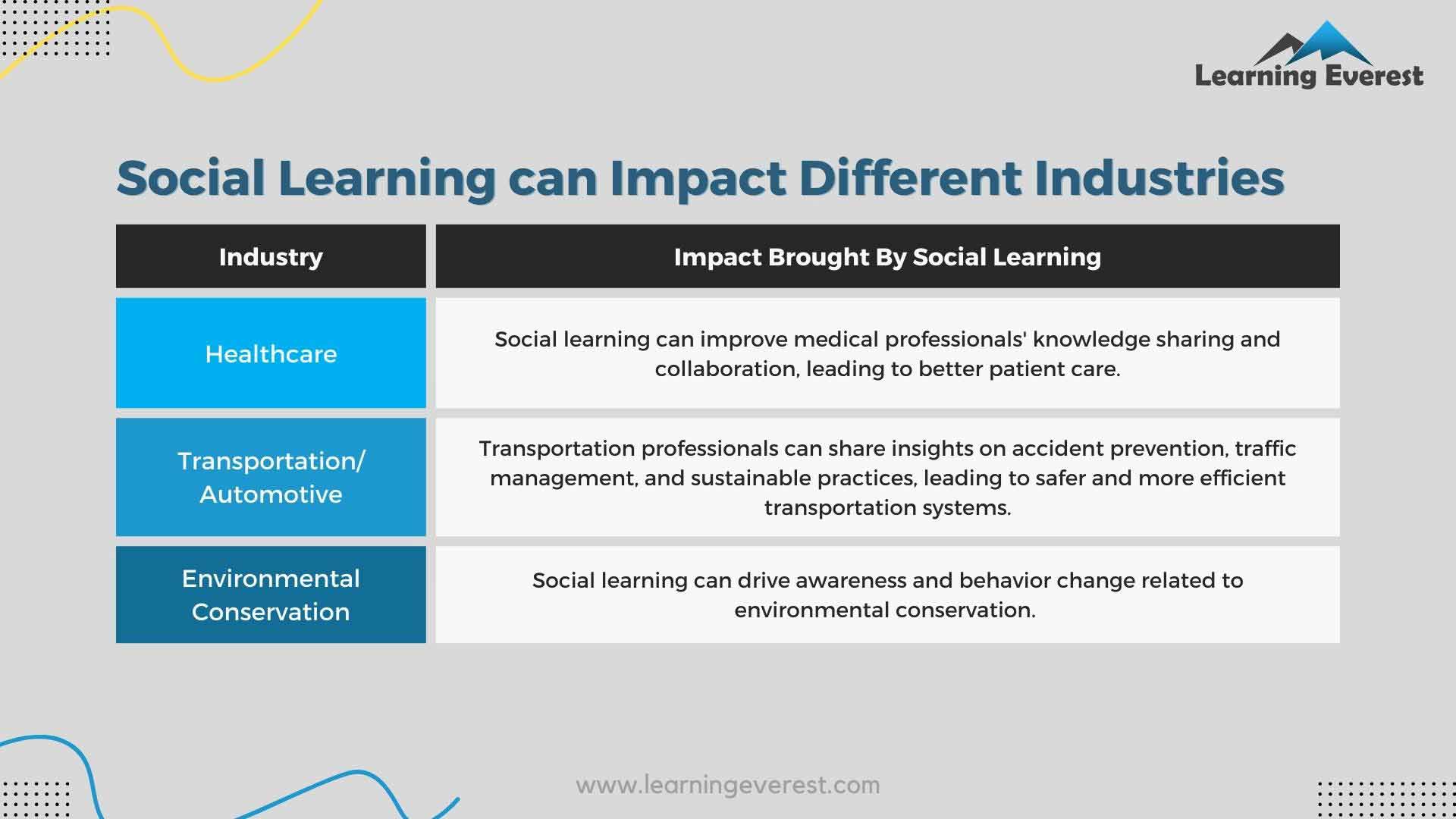
Social Learning Can Impact Different Industries
Some principles of observational or social learning theory
Several guiding principles underpin the observational learning or social learning theory:
- According to social learning theorists, people can learn through observation. Learners educate themselves by directly observing the behaviors of others and by following the consequences of using those behaviors.
- Cognition, which takes place in a social setting, plays a specific role in learning. Awareness and expectations of future reinforcements or punishments impact the behaviors people exhibit.
- Social learning theory is a bridge or transition between behaviorist learning theories and cognitive theories.
- The observer will imitate the model’s behavior if the model possesses characteristics. It is characteristics like talent, intelligence, power, good looks, or popularity that the observer finds attractive or desirable.
- Social learning theory recognizes that reinforced or rewarded behavior gets repeated. The observer will react to how the model is treated and mimic the model’s behavior. When the model’s behavior receives rewards, the observer is more likely to reproduce the rewarded behavior. When the model gets punishment, the observer is less likely to reproduce the same behavior in the future.
- There is a distinction that exists between an observer’s “acquiring” a behavior and “performing” a behavior. Through observation, the observer can acquire the behavior without performing it. The observer may display the behavior later in situations where there is an incentive to do so.
- Social learning theory also considers that a person’s self-efficacy influences learning. Self-efficacy is a person’s judgment about whether or not they can successfully acquire knowledge.
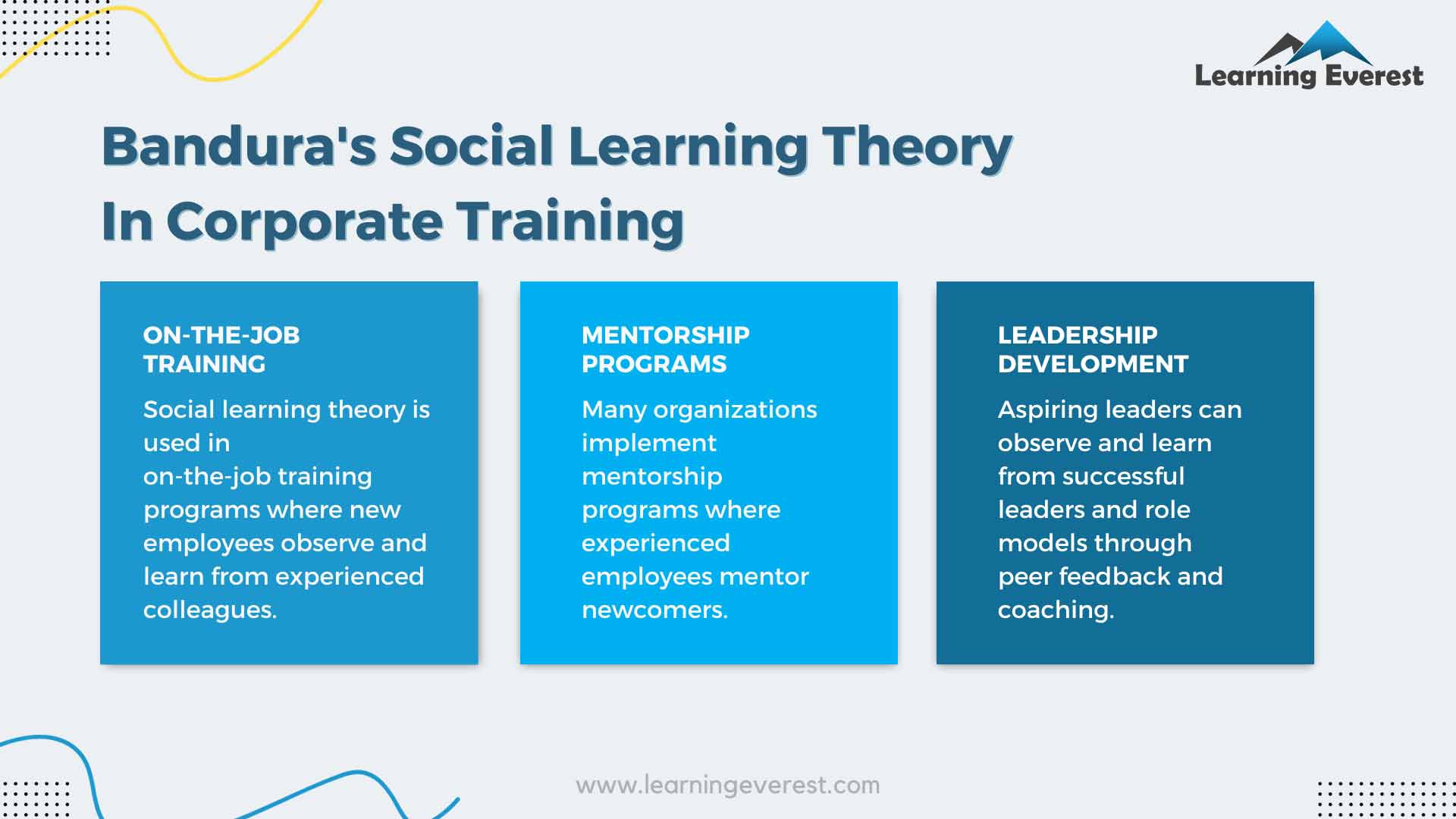
Bandura’s Social Learning Theory In Corporate Training
Implications of social learning theory
Social learning theory has numerous implications for learning:
- Using this theory, learners learn a great deal simply by observing others.
- Describing the consequences of behavior increases appropriate behaviors, decreasing inappropriate ones. It includes discussing the rewards of various behaviors.
- Modeling provides an alternative to teaching new behaviors. Instead of using shaping and operant conditioning, modeling is a faster, more efficient means of teaching. To promote effective modeling, facilitators must ensure the four necessary conditions exist with observation: attention, retention, motor reproduction, and motivation.
- Facilitators must set an example for their learners and watch out for bad behavior.
- Facilitators should expose learners to various models, which is essential to break down stereotypes.
- Learners must believe that they can accomplish a task; it is essential to develop a sense of self-efficacy for learners. Facilitators can promote such self-efficacy by making learners receive confidence-building messages, watch others succeed, and experience success independently.
- Facilitators should support learners in creating demanding yet reasonable expectations. There are occasions when a learner cannot complete a task.
- Self-regulation methods are an efficient way to change learners’ behavior.
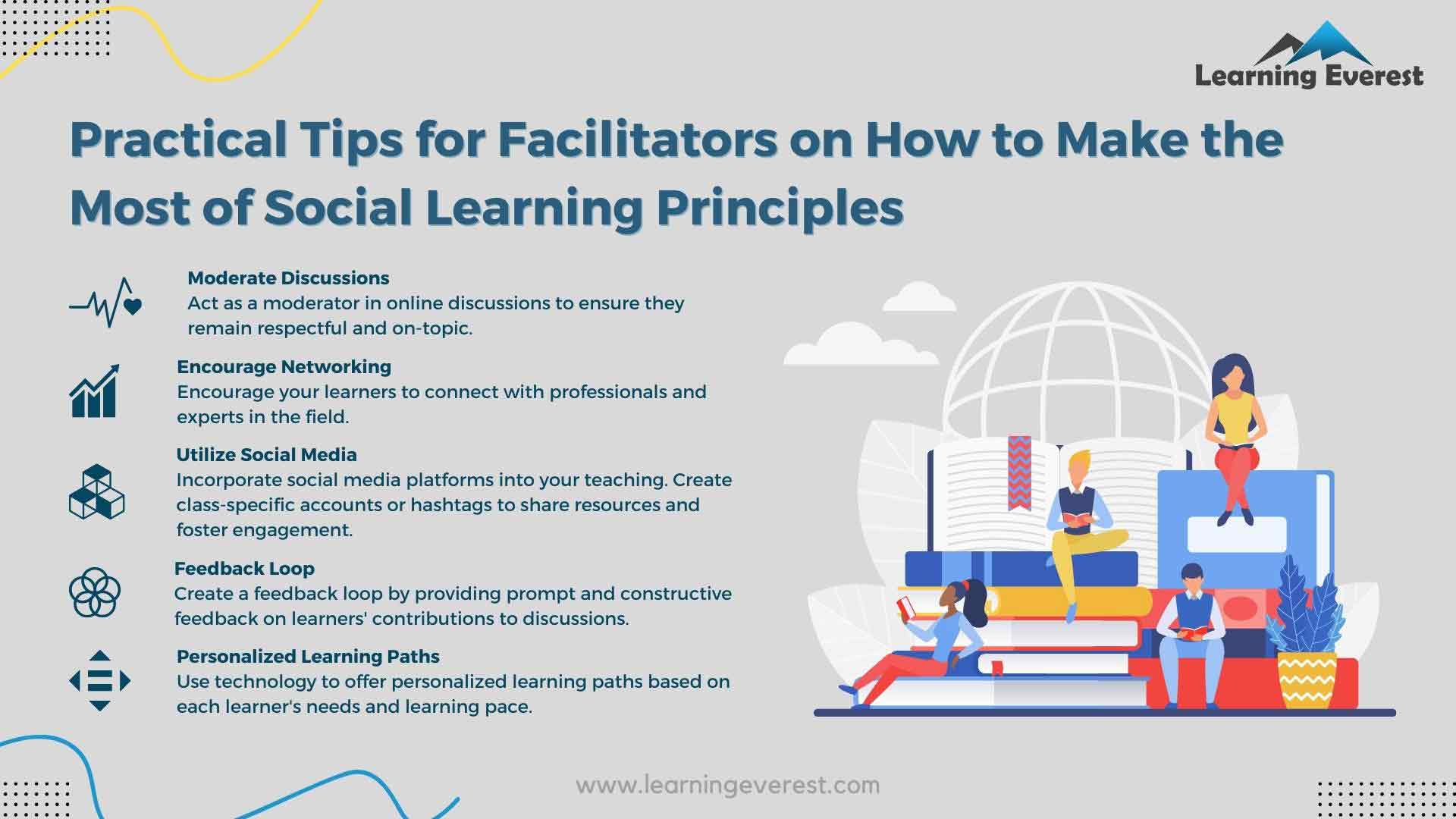
Practical Tips for Facilitators on How to Make the Most of Social Learning Principles
Advantages of social learning theories
The social learning theory has the following advantages:
- The theory is scientific because it results from several tests and research projects.
- The theory emphasizes the value of the surrounding environment and role models.
- The idea provides a sufficient justification for how many behaviors, including violence, are learned.
- The theory appears to be accurate and testable. It offers adequate clarification of taught behavior.
- The theory makes it possible to use practical knowledge in real-world circumstances.
- It boosts participation among disinterested learners.
- Learners gain self-management abilities.
- It promotes cooperation among the learners.
Disadvantages of social learning theories
The social learning theory has the following flaws:
- Since the trials are hypothetical, the outcome might not represent accurate behavior.
- The theory dismisses or ignores the significance of nature in learning.
- This theory of learning does not take into consideration biological factors.
- The theory’s explanation of learned behavior is too straightforward.
- This explanation does not account for the changes that occur throughout a person’s lifetime.
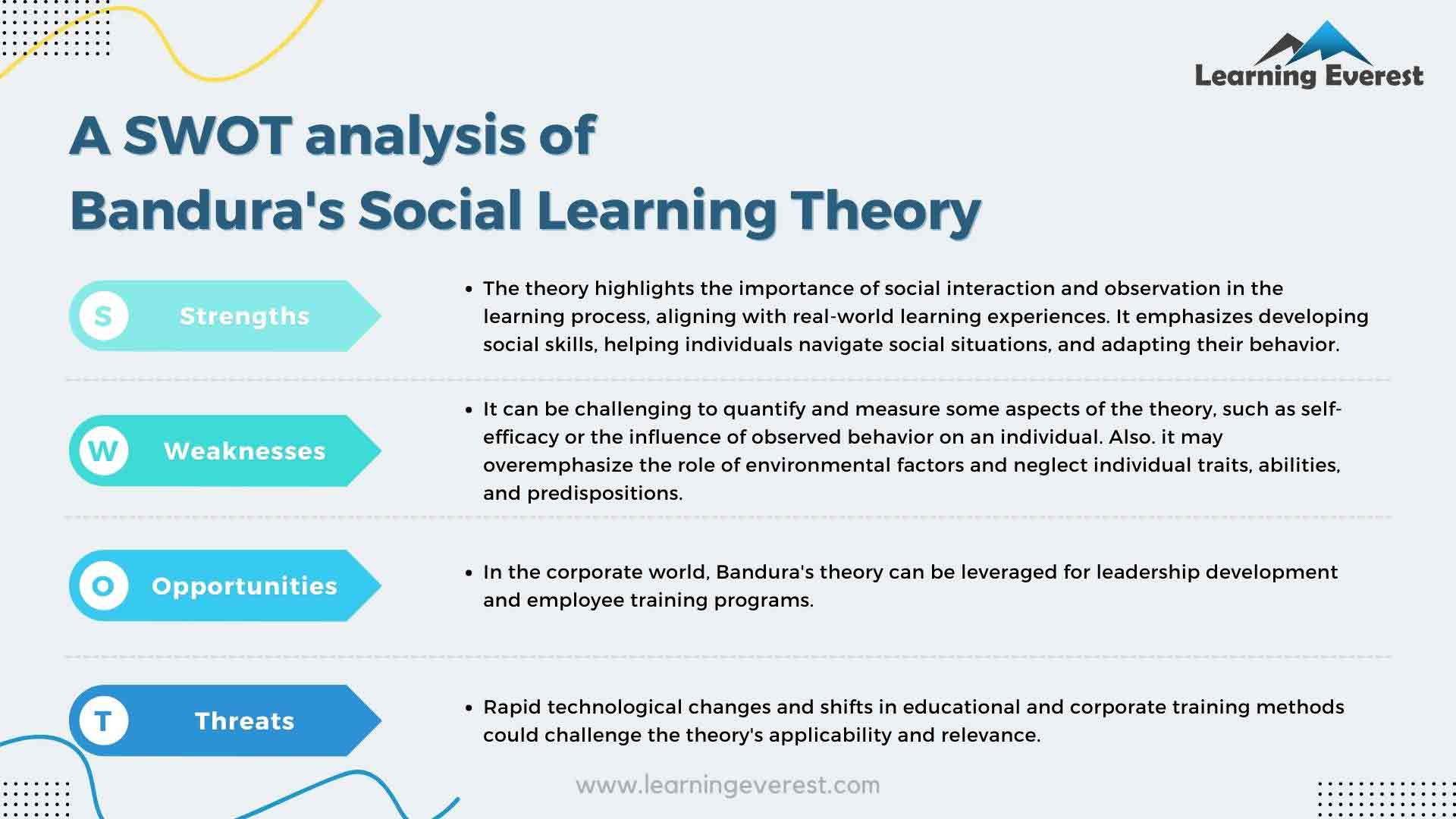
A SWOT analysis of Bandura’s Social Learning Theory
Infographics
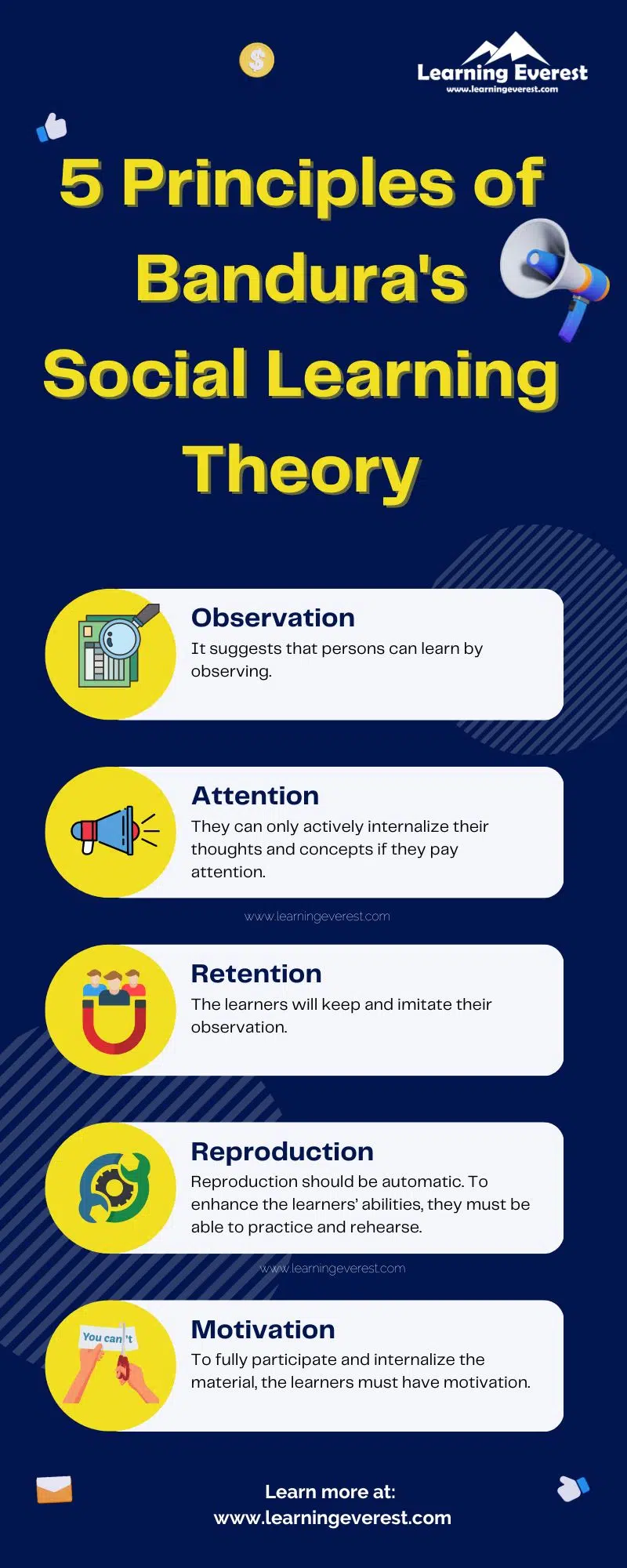
Social learning theory
Knowledge Check!
Conclusion
To sum up, the principles of social learning are beneficial for businesses and every social and behavior change communication program that seeks to change social behaviors, especially those that are complicated or require interactions with others. It might be beneficial when a specific behavior is hard to describe without modeling. Furthermore, social learning theories show how a person can succeed when facing obstacles or difficulties while adopting or engaging in a particular activity.
Lastly, social learning principles can alter perceptions of the social environment, making activities seem more frequent and offering social support to people considering a behavior change. It is because people adopt and practice behaviors; they see others performing.
Frequently Asked Questions (FAQs)
What are the 5 principles of social learning theory?
Albert Bandura proposes five essential learning principles: observation, attention, retention, reproduction, and motivation.
What is the main idea of social learning theory?
The social learning hypothesis seeks to demonstrate that people may learn differently. People make decisions based on their reflection, but their environment impacts how they act and develop.
Why is social learning important?
The principles of social learning are beneficial for businesses and every social and behavior change communication program that seeks to change social behaviors, especially those that are complicated or require interactions with others.
What are the benefits of social learning theory?
Some benefits of social learning include increased engagement across disengaged learners, developed self-organization skills in learners, and encouraged collaboration.






That was excellent
For people in the future, please tell us the name of the author and date of publication for this article so we can cite it as a source in our papers. Or just give us a citation please. This is one of the only pieces of evidence I could find related to this topic, and I’m hesitant to use it in my paper because I can’t find the author’s name or a date of publication.
Hi Nick, The author of this post is Learning Everest Team.
This is great 😃👍 Thank you!
Thanks Martha!